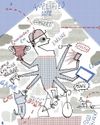
The concept of a business ecosystem was first articulated by the strategist James F. Moore in his seminal 1993 Harvard Business Review article, “Predators and Prey: A New Ecology of Competition,” and the idea has since gained substantial currency. A business ecosystem is a community of enterprises and related organizations that coevolve over time and align themselves with directions set by one or more central companies. Examples of business ecosystems include a computer company and its users, investors, and third-party app developers; or an energy company with its network of suppliers, customers, traders, and resellers; or an auto manufacturer and the suppliers, retailers, and marketers that surround it.
The ecological analogy is apt because it emphasizes the fact that ecosystem members may both cooperate and compete with one another in complex ways that lead the entire community of enterprises to thrive. But there’s a key difference between biological and commercial ecosystems. In nature, ecosystems can survive and thrive for long periods of time, almost in perpetuity. By contrast, business ecosystems tend to fall apart in a matter of decades, and the “clock speed” seems to be increasing. Furniture manufacturers near High Point, N.C., flourished for more than a century after reaching critical mass in the 1890s, whereas the minicomputer ecosystem, located along Massachusetts’s Route 128, lasted for less than 30 years after its 1960s heyday.
This story is from the Summer 2020 edition of strategy+business.
Start your 7-day Magzter GOLD free trial to access thousands of curated premium stories, and 9,000+ magazines and newspapers.
Already a subscriber ? Sign In
This story is from the Summer 2020 edition of strategy+business.
Start your 7-day Magzter GOLD free trial to access thousands of curated premium stories, and 9,000+ magazines and newspapers.
Already a subscriber? Sign In

Transforming information into insight
Focus on six organizational elements to build a world-class data and insights capability.

THE URGENT NEED FOR SOPHISTICATED LEADERSHIP
The pandemic has highlighted a series of paradoxes inherent to the work of leaders. What comes next will depend on how well leaders face up to them.

The road to successful change is lined with trade-offs
Rather than trying to convince people your change initiative is the right one, invite them to talk openly about what it might take to implement it: the good, the bad, and the frustrating.

Sustaining productivity virtually
Maintaining productivity levels among remote employees is an enduring challenge. Here are five ways to help businesses and employees thrive while people work at home.

FORWARD TO normal
Entertainment and media companies are building business models that are resilient to the enduring changes in consumer behavior ushered in by COVID-19.

How leaders can promote racial justice in the workplace
Embrace four principles to turn today’s diversity, equity, and inclusion initiatives into sustained progress.

CREATING THE OFFICE OF THE FUTURE
In a remodeled world, it is vital for companies to reinvent ways of working.

Consumer companies must take leaps, not steps
As shoppers show how quickly they can adapt to external shocks, retailers will need to radically reconfigure their business models.

Businesses can fast-track innovation to help during a crisis
“Unrealistic” timelines can actually work. Here’s how.

Agility and experience management work better together
Many companies achieve early wins with separate transformational efforts, then stall. But if combined and enhanced using “return on experience,” or ROX, measures, these two programs can unlock each other’s potential.